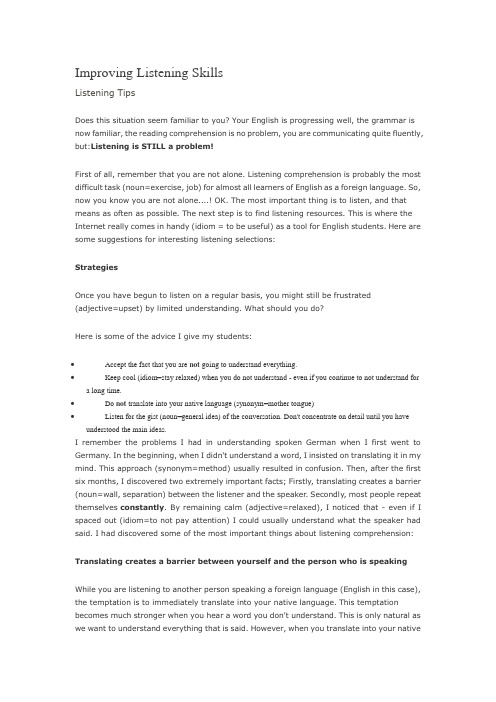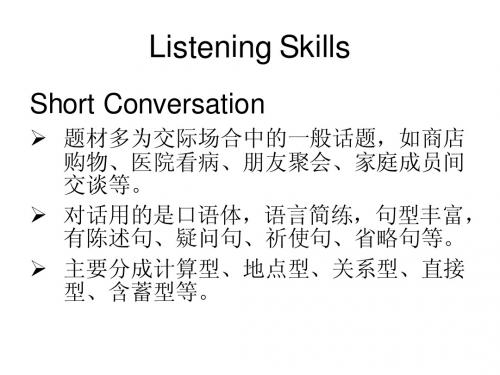Listening Skills
listening skill tips 英语听力技巧

Improving Listening SkillsListening TipsDoes this situation seem familiar to you? Your English is progressing well, the grammar is now familiar, the reading comprehension is no problem, you are communicating quite fluently, but:Listening is STILL a problem!First of all, remember that you are not alone. Listening comprehension is probably the most difficult task (noun=exercise, job) for almost all learners of English as a foreign language. So, now you know you are not alone....! OK. The most important thing is to listen, and that means as often as possible. The next step is to find listening resources. This is where the Internet really comes in handy (idiom = to be useful) as a tool for English students. Here are some suggestions for interesting listening selections:StrategiesOnce you have begun to listen on a regular basis, you might still be frustrated(adjective=upset) by limited understanding. What should you do?Here is some of the advice I give my students:∙Accept the fact that you are not going to understand everything.∙Keep cool (idiom=stay relaxed) when you do not understand - even if you continue to not understand fora long time.∙Do not translate into your native language (synonym=mother tongue)∙Listen for the gist (noun=general idea) of the conversation. Don't concentrate on detail until you have understood the main ideas.I remember the problems I had in understanding spoken German when I first went to Germany. In the beginning, when I didn't understand a word, I insisted on translating it in my mind. This approach (synonym=method) usually resulted in confusion. Then, after the first six months, I discovered two extremely important facts; Firstly, translating creates a barrier (noun=wall, separation) between the listener and the speaker. Secondly, most people repeat themselves constantly. By remaining calm (adjective=relaxed), I noticed that - even if I spaced out (idiom=to not pay attention) I could usually understand what the speaker had said. I had discovered some of the most important things about listening comprehension:Translating creates a barrier between yourself and the person who is speakingWhile you are listening to another person speaking a foreign language (English in this case), the temptation is to immediately translate into your native language. This temptation becomes much stronger when you hear a word you don't understand. This is only natural as we want to understand everything that is said. However, when you translate into your nativelanguage, you are taking the focus of your attention away from the speaker and concentrating on the translation process taking place in your brain. This would be fine if you could put the speaker on hold (phrasal verb=to make a person wait). In real life however, the person continues talking while you translate. This situation obviously leads to less -not more- understanding. I have discovered that translation leads to a kind of block (noun=no movement or activity ) in my brain which sometimes doesn't allow me to understand anything at all!Most people repeat themselvesThink for a moment about your friends, family and colleagues. When they speak in your native tongue, do they repeat themselves? I don't mean literally (adverb=word for word), I mean the general idea. If they are like most people I have met, they probably do. That means that whenever you listen to someone speaking, it is very likely (adjective=probable) that he/she will repeat the information, giving you a second, third or even fourth chance to understand what has been said.By remaining calm, allowing yourself to not understand, and not translating while listening, your brain is free to concentrate on the most important thing: Understanding English in English.Tips∙Listen to something you enjoyProbably the greatest advantage about using the Internet to improve your listening skills is that you can choose what you would like to listen to and how many and times you would like to listen to it. By listening to something you enjoy, you are also likely to know a lot more of the vocabulary required!∙Listen for KeywordsUse keywords (noun=principal words) or keyphrases to help you understand the general ideas. If you understand "New York", "business trip", "last year" you can assume (verb=to take for granted, suppose) that the person is speaking about a business trip to New York last year. This may seem obvious to you, but remember that understanding the main idea will help you to understand the detail as the person continues to speak.∙Listen for ContextLet's imagine that your English speaking friend says "...I bought this great tuner at JR's. It was really cheap and now I can finally listen to National Public Radio broadcasts." You don't understand what a tuner is. If you focus on the word tuner you might become frustrated. However, if you think in context (noun=the situation explained during the conversation) you probably will understand. For example; bought is the past of buy, listen is no problem and radio is obvious. Now you understand: He bought something - the tuner- to listen to the radio.A tuner must be a kind of radio! This is a simple example but it demonstrates what you need to focus on: Not the word that you don't understand, but the words you do understand.SummaryIt might seem to you that my ideas on how to listen encourage you to not understand everything. This is absolutely correct. One hundred percent understanding is something to work towards(phrasal verb=to have as a goal, a plan for the future) and not to expect of yourself now. Listening needs a great amount of practice and patience. Allow yourself the luxury of not becoming nervous when you do not understand, and you will be surprised by how quickly you do begin to understand.Listening often is the most important way to improve your listening skills. Enjoy the listening possibilities offered by the Internet and remember relax......。
Listening Skills

关键词:waste, money, time 情态动词句型:we should have stayed at home.
3. 边听边快速记录 数字、地名、方向、人名、日期、年龄等关键信 息要迅速记下,可以用缩写或自己能看懂的符号 速记下来。
4. 注意力高度集中 解题信息在一问一答中,因此必须保持全神贯 注 的状态,若解题过程中有个别难题拿不定主意, 可任选一项,然后集中到下一题,千万不要一边 听录音一边想这前一题的内容,这样将造成一错 再错,并会造成紧张情绪。
5. Implied Information assessment 隐含信息判断题 M: I think there is something wrong with your bike. If you don’t mind you can use mine. W: When have you been so generous? Q: What does the woman mean? A) The man used to be very generous. B) The man has never been so generous before. C) The man is not willing to lend his bike. D) She is unwilling to use the man’s bike. 关键:女方回答语气中的怀疑态度。 要求理解字里行间的意义之后,根据对话中的某些 词、短语、句子及说话人的语气推断出说话人所表 示的意义。
A) 5346785 B) 5396785 C) 5356785 D) 5326785
2. 抓住关键词等语言信息
话语中的实义词(名、动、形、副、数词等)都 是强度词。在语流中强而慢,通常都能听清楚, 实义词是产生意义的关键词。抓住关键词,就能 大大加强对语义的理解。 根据对话中的语气、语调、重音、句子中的语法 结构(否定式、比较句、虚拟语气句、让步和转折、 情态动词+现在完成时态)等可以推测对话某一方 的意图、态度、要求及说话的内容;通过对方所谈 话题或者说话口吻可以推测他们的身份以及彼此之 间的关系;根据说话者之间的相互关系可以推断对 话发生的场所。
listening skills

听力技巧听力技巧(一)提醒考生务必先看选项。
当录音人开始宣读 Directions 时,考生应充分利用这段时间速读选项,预测考点,从而做到心中有数。
通过先看选项,可以明确1)题目涉及到的人物、地点、场合等,在非主题题型中,可能暴露该题的主题。
考生可以通过对全部选项的速读建立起一个大概的场景,比如:图书馆、医院病房等,从而联想起与该环境有关的词汇2)当四个选项是同类短语时,考点就在这一细节。
这时,考生应充分集中精力,听懂时间3)尽管四个选项中只有一个正确答案,其余的三个选项设置也并非和题目毫无关系。
利用设定干扰选项所遵循的规律,我们可以大胆地进行猜想。
这种猜测其实并不耽误时间,也不怎么消耗脑力,考生反而能够通过猜想事先得到一个对该题的印象。
结合四个选项的共同点,我们往往可以得到大量的提示,有时候,甚至可以把答案猜得八九不离十。
真正听题的时候,考生可以和录音人给出的信息进行比较,轻易排除错误选项,直达正确答案。
举例如下:请考生铭记:对待一切听力考试都行之有效的第一条战术是:抓紧时间先看选项并提炼其中的信息点和主题。
听力技巧(二)掌握节奏可能没有哪种考试对时间安排的要求比听力考试还要苛刻。
“录音不等人”,所以很多考生答题时都很紧张。
其实,听力考试每分钟阅读的字数和停顿时间有严格限制:约每分钟140 词,每个问题后有约15秒停顿。
这就象是跳舞唱歌,拍子已经固定,我们要做的是跟上节奏,过分的紧张只会造成混乱,直接影响发挥。
请考生铭记:掌握节奏,按部就班地做好答题准备,就相当于拥有双倍的答题时间!听力技巧(三)听力是一种ParaphraseParaphrase 就是运用同类词语的替换或句型的变换解释句或段的意义。
听力考试多数时候是一种paraphrase考试,它往往考的不是考生是否听见,而是考考生是否听懂。
把命题中的对话和段落原封不动地照搬到答案里,等着考生把它挑出来,在六级听力考试中这种题型几乎找不到。
绝大多数题目,要求考生把听到的原文进行变换和归纳,对应到选项中。
listeningskills听力技巧和常用方法

Practice(练习).发音有问题是难免的,因此很多人会 害怕说错而不开口。没关系,多练习就好了,不要害羞。
Find a partner(找伙伴).从别人那里得到反馈是很重 要的。找个也对提高英语水平感兴趣的伙伴,互相鼓励, 互相比赛,多对话。
Be poetic(充满诗意).大声地念诗、演讲,专注在字的 重音和音调。因为,诗歌通常都是琅琅上口,有节奏感 的,多多练习有助于提高英语水平。发音准了,语调对 了,语感慢慢出来了,这对记忆单词和交流都有好处。
泛听
泛听目的有二:一是练习捕捉大意,让理解单位从 “词汇”到“句子”再到“大意”;二是熟悉语速和 语境,既真实英语的使用环境。切忌把泛听当精听。 战胜“细节完美主义”的办法是重大意而非细节,重 内容而非语言,重正在听的内容而非听过的内容。
“拳不离手,曲不离口”,泛听要形成“磨耳朵” 的习惯,充效果。
学习方法与策略
在阅读过程中、从书本例句中、从对话中 看、听到地道、标准、典型、或优美的句 子摘抄下来。
将每一个摘抄的句子分别记在不同卡片或 纸条上随身携带。
随时取出尽量做到大声、快速、清晰地读 几遍。
.经常回忆所记的句子。
suggestions
Listen to yourself(听自己).如果你不能听出你自 己的发音问题,就很难去改正它。试着把你的朗读或 演说录下来,并与以英语为母语的外国人士做个比较。
Listen for key words. Key words are stressed. They are louder, longer, and higher pitched than other words. These are the words that the speaker thinks are most important in a sentence. For example, notice the stress and intonation in this dialogue: A: I went to the store. B: Which store?
listeningskills解读

(六) 留意有关货币
• 在听力材料中,有很多是围绕有关外国货币的内容设计的,因此,熟 悉一些主要国家的货币名称也很重要。常见的货币名称可以提示你对 话发生在什么国家或地区,也为证明说话者身份提供了信息。下面列 举一些常见货币名称: Dollar Franc Lira Mark Peso 墨西哥比索 Pound Ruble Yen 另外,还应知道在美元体系中,还有dime(一角银币),nickel(5分镍 币),cent(分)等单位及其之间关系。 • 讲到货币,还要对银行系统相关词汇有所了解。存款(deposit),汇款 (remittance),兑换(exchange),外币(foreign currency), 汇率(rate), 信用卡(credit card),旅行支票(traveling check),遗产委托(heritage entrustment),有的银行还经营金融市场(financial market)、证券 交易所(stock exchange),用信用卡结算时,由银行扣除(deduct)。
(八)重视条件从句
• 四级题目中有不少是通过条件句来表达建议、想法、结果和趋势等。因此, 能正确理解和抓住说话者所要表达的真实意图至为重要。条件句有两种,一 是真实条件句,二是虚拟条件句。真实条件句表达的意思是直接而明显的, 一般指有可能实现;虚拟条件句是间接而含蓄的。对后者应有足够的谨慎。 M:If I go to the store, will you make dinner for us tonight? W:Bring back enough food. Q:What will the woman do if the man shops? A) The woman will cook. B) He won’t buy enough. C) He’ll get in a bad mood. D) He will make dinner 应选A) 又如: W:Did you see film last night? M:I wouldn’t have gone to see it if I’d known it was boring. Q:Where was the man last night? A) In a bar. B) In a cinema. C) At a lecture. D) Unreasonable. 应选 B) 条件句中以if引导居多,注意这种句式的表达特点。 它们经常用省略的形 式,如if possible, if any, if not, if so, if necessary, if needed等,听省略形式 的条件句,主要应该抓住主句的基本内容,因为条件句不易听错,只要抓住 了主句的基本内容,就能正确做题。此外,表示条件的连词,除了if外,还有 as long as, so long as, suppose, supposing, let’s say, unless, without等。
英语视听说UNIT1 Listening Skills

energy: low
— extremely sad and upset: heartbroken
Brainstorm
Sample Answers c:
Listening Skills
— extremely angry: furious, flying into a rage, outrageous, wrathful (mainly literary)
— feeling happy at a particular time: cheerful, in a good mood, light-hearted
— always happy: happy-go-lucky, cheerful, good-natured, optimistic, contented, positive
(Taken from MACMILLAN English-Chinese DICTIONARY)
Brainstorm
Sample Answers b:
Listening Skills
— sad because a person or situation has made
you feel like this: unhappy
I am happy when I associate with those I want to be like, thus giving myself the opportunity to learn from them adding to my identity.
I am happy when I am with my friends, talking and laughing, sharing our happiness and difficulties in life.
Listening Skills
Nature of listening as a skill
• Besides the division of the skills as „receptive‟ and „productive‟, another subdivision focuses on „one-way reception‟ and „interactive reception‟ in this age of active learning. Reading and writing are one-way skills where learners don‟t get direct feedback. But in speaking and listening, learners may have their understanding and reproduction checked instantly. Thus active and self-learning takes place.
What will be checked?
• What „listening‟ really means is „listening and understanding what we hear at the same time‟. So, two concurrent actions are demanded to take place in this process.
• Even as a receptive skill, listening differs greatly with reading as reading materials are printed and permanent enough where the learners are required to interact with the next sentence using the knowledge of the previous one while listening involves continuous material presentation where they have to respond to the immediate expression. From the view point of “product” or “process”, listening is more a process than a product which instantly shapes the understanding and utterances of the learners.
listen skills 聆听技巧
• Show that I Care 显示关心 • Better Understand My World 更好了解自身 • Improve My Memory 提高记忆力 • Be a Better Manager 成为较好的经理
Active Listening 生动地来听
Rule #4) – Take Notes 作记录
Active Listening 生动地来听
Rule #5) – Response to the total communication. 外部答复 (content, intent & non-verbal communication) Rule #6) – Control your anger (you know what makes you red, be prepared) 控制发怒
controlling your emotions. (worry about kids’
school records) 取消内部干扰 Rule #3) – Come to meeting prepared look over the agenda, do your home work. (bring writing pad) 打有准备之仗-会议有日程
• and ………… 其他很多.
Active Listening 生动地来听
Body Language 肢体语言55% Tone of Voice 语调 35%
Verbal 口头 10%
问一问网上的女士
Active Listening 生动地来听
1 – Inactive Listening 被动地听 2 – Selective Listening 选择地听 3 – Active Listening 主动地听 4 – Reflective Listening 沉思地听
Listening skills
填充(Gapfill)
Item
What? Where?
When?
Who?
How?
Why?
News Item 1
News Item 2
真假题(True/False)
• 细心地阅读题目指示 • 须留意的关键词或句,知道什么时候轮 到什么问题 • 主要说话的人有没有改变主意
地图题
• 1. 先看地图,后看题目 2. 看地图,先抓图例、指向标、说明文字、起 始点(实质:从某一点走向另外一点entrance gate exit door 标志词) 3. 扫描图中其他信息:街名、建筑物名、过 道名、街区名 4. 在做题时,可以按照听力磁带的叙述,用 笔在图中画出路线 5. 图中方向以说话人前进方向为左右,不能 用自己的主观视角
笔记的主要内容和形式
• 确定核心话题 • 记录与其相关的细节. 主要的细节为 what , when, where , who , why和 how等 1)主要记录实词:名词,动词,形容词。这次 词用简写、符号和缩写的速记法方法记录
笔记的几个原则
Listening skills
1)预测是听力的关键.在预测时还要注意这些词语的 变体,以及所缺部分的变体 • 2)短暂记忆 • 3)集中而脱离 • 4)跟随转换信息。留意记号字或句 And now (we will) .../- Before I move on to .../- And what about ...? ./- Next, I’d like to .../- Right, so the first thing .../- I"d like not to move on to ... ./Well, that"s about it, except for ...- Finally, can you tell us ... ./- To start with .../- One more thing… •
Listening Skills
• Recognize the function of word stress in sentences.
• Recognize the function of intonation in sentences.
Top-down processes
• Use key words to construct the schema of discourse. • Infer the role of the participants in a situation. • Infer the topic of a discourse. • Infer the outcome of an event. • Infer the cause and effect of an event. • Infer unstated details of a situation. • Infer the sequence of a series of events. • Infer comparisons. • Distinguish between facts and opinions.
Educational Concerns
Types: Gist – only listen for main idea Selective - focus on certain information Intensive - focus on details
Bottom-up processes
• Retain input while it is being processed. • Recognize word divisions. • Recognize key words in utterances. • Recognize key transitions in a discourse: • Another interesting development was… • One of the problems was… / In contrast… • Recognize grammatical relations between key elements in sentences.
- 1、下载文档前请自行甄别文档内容的完整性,平台不提供额外的编辑、内容补充、找答案等附加服务。
- 2、"仅部分预览"的文档,不可在线预览部分如存在完整性等问题,可反馈申请退款(可完整预览的文档不适用该条件!)。
- 3、如文档侵犯您的权益,请联系客服反馈,我们会尽快为您处理(人工客服工作时间:9:00-18:30)。
L Skills
istening
Knowledge Tip
How to write a résumé? A good résumé should be no more than one page. It usually includes the following parts. Some parts are optional according to individual situations.
Pair Work
L Skills
istening
1. What makes you believe you could handle the position?
Words and Expressions a fast learner a conscientious worker a hardworking person enjoy learning on the job be good at communicating with colleagues be confident be equipped with professional information and knowledge that the job requires meet challenges handle the challenge prove myself
Role-play
L Skills
istening
Situation:
A is the manager of the Human Resources Department of a state-owned enterprise. B is a graduate who majors in computer science. A is interviewing B, asking him some questions, such as B’s qualifications for the vacancy, reasons for applying for the position, and his future career plan.
Role-play
L Skills
istening
Sample dialogue:
A: You don’t have any work experience or I can say you don’t have enough qualifications for this job. What makes you believe you can handle the position? B: I am a fast learner and a conscientious person. I am confident I can handle the challenge. Given a chance, I can prove myself. A: Why would you like to work for our company?
Knowledge Tip
L Skills
istening
References: People who can provide more information on you if the employer hopes to contact them. Education or career history should be listed in reverse chronological order. DO NOT list personal information, such as: marital status, physical health, height, weight, religious affiliation, race, or what you had for breakfast on this documkills
istening
Sample Answer I aim to have been promoted to I’m senior manager at the very least. I m very ambitious and want to climb up the career ladder as fast as possible. I don’t don t want to feel miserable on the years’ first rung in five years time, watching everybody above me.
feel proud to work for such a company contribute a great deal to its success
Pair Work
L Skills
istening
Sample Answer
Well, it has a good reputation as an employer, and its products are quite popular in the marketplace. I would feel proud to work for a company like this and to contribute a great deal to its success.
Knowledge Tip
L Skills
istening
Your contact information:
Who you are and how your reader can reach you.
Objective statement:
Your career direction and the position for which you're applying.
istening
Education: The dates of educational achievements, if they are current, within the last 10 years or so. Other information of interest: Any associations or professional organizations for which you're a member / hobbies and outside activities/ all volunteer work if they hold some value to the position you are applying for.
Pair Work
L Skills
istening
Sample Answer I’m a fast learner and enjoying m learning on the job. My natural I’m skills lie in this area, and I m confident that I could handle the challenge. Given a chance, I would prove myself.
Objective Pair Work Role-play Knowledge Tip
Objective
To get the basic idea about a job interview and résumé-writing.
L Skills
istening
Pair Work
Directions Suppose you are a college graduate and seeking for a job. You are going to have an interview. How do you answer the following most-commonlyasked questions? Please consult the given words and expressions after each question and exchange your answers with your peer.
Pair Work
L Skills
istening
3. Where do you see yourself in five years’ time?
Words and Expressions aim to have been promoted to … gain much work experience want to climb up the career ladder as fast as possible be able to handle every obstacle and challenge in the job accumulate experience of running a company be ambitious
Pair Work
L Skills
istening
Words and Expressions
have a good reputation its products are popular
2. Could you tell me why you would like to work for our company?
Role-play
L Skills
istening
B: It has a good reputation as an employer. Its products are quite popular in every corner of our country. I will feel proud to be a member of such a company. A: Where do you see yourself in five years’ time? B: I am ambitious and want to develop myself in this trade as fast as possible.
